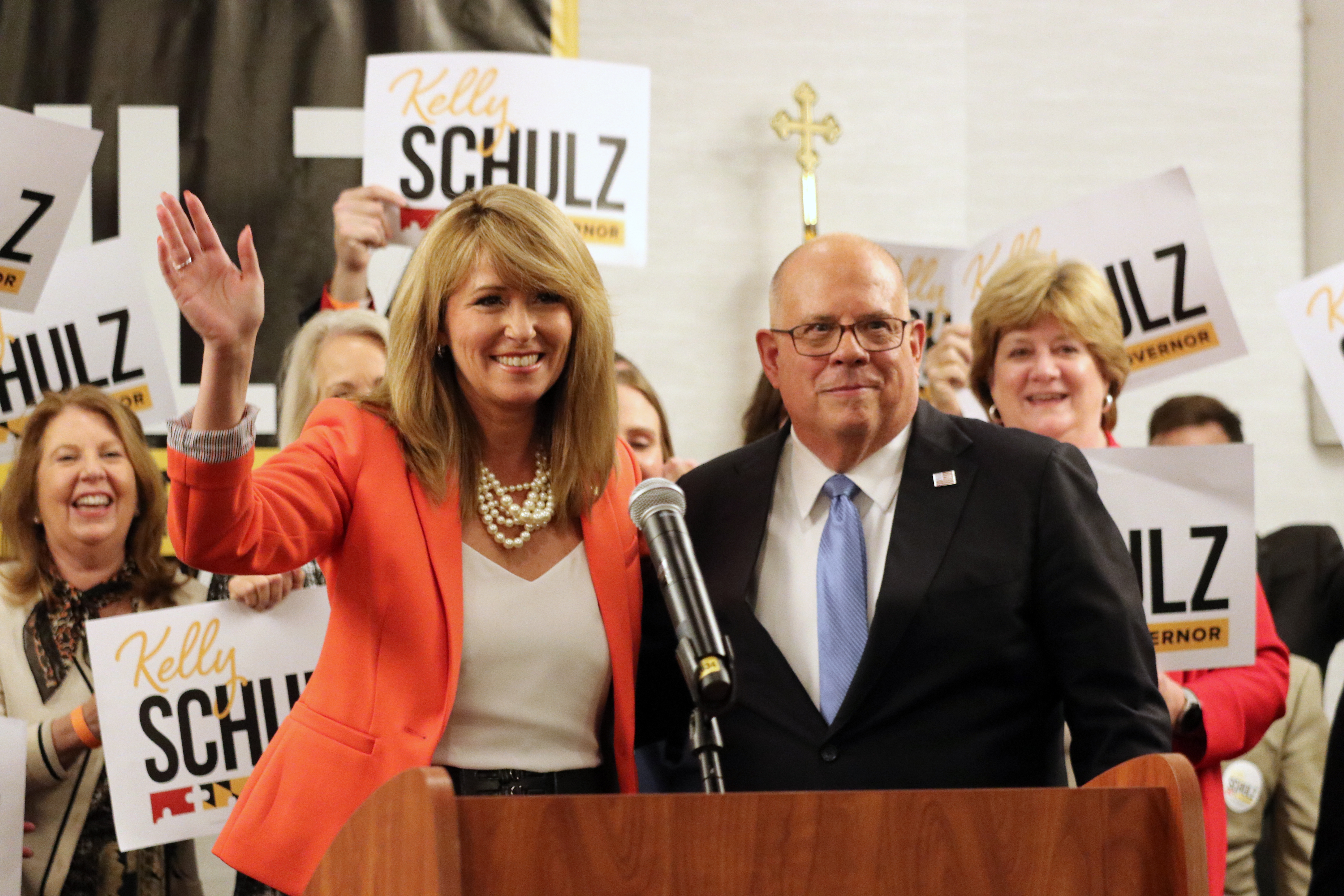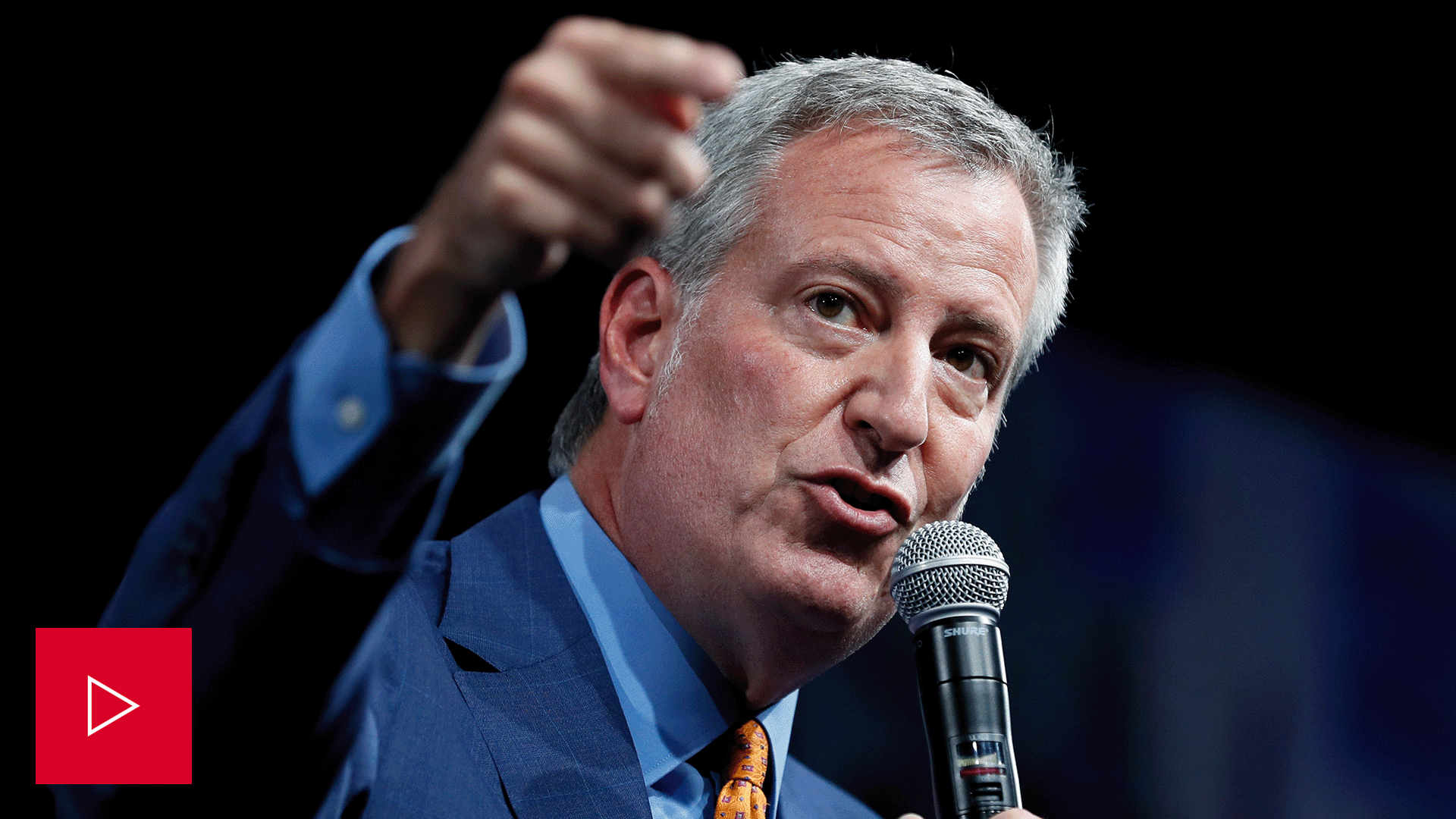| | |  | BY DAVID SIDERS | | With help from Joanne Kenen and Calder McHugh
| 
Kelly Schulz, who is seeking the Republican nomination for governor of Maryland, after receiving the endorsement of current Gov. Larry Hogan. | AP Photo/Brian Witte | BLUE STATE BAROMETER — In a primary season that’s offered a battery of tests of Donald Trump’s hold on the Republican Party, the gubernatorial primary unfolding tonight in Maryland may reveal more than most about the GOP’s post-Trump state of mind — and his 2024 prospects. That’s because unlike in a red state like Ohio or Nebraska — or even a swing state like Pennsylvania or Georgia — Maryland’s election isn’t purely a preference statement. Republicans in Maryland know their state’s electorate is so heavily Democratic that there’s probably only one kind of Republican who has any chance of winning in November. It isn’t the Trumpian kind, which means we’re about to see just how much electability matters to GOP primary voters. According to a Goucher College poll in late June , 44 percent of Republicans were still undecided, with a close race between Dan Cox, the Trump-endorsed state lawmaker who organized buses to Washington for the rally preceding the riot at the Capitol on Jan. 6, 2021, and Kelly Schulz, the former state Commerce secretary preferred by Larry Hogan. Hogan, the popular term-limited Republican governor, is a Trump nemesis and potential rival in 2024. “It is sort of a moment, a stark moment, about what kind of party you want to be going forward , not just in a state like Maryland, but across the country,” said Michael Steele, the former Republican National Committee chair who considered, but ultimately decided against, running for Maryland governor himself this year. “Larry Hogan, [former Maryland Gov.] Bob Ehrlich lit a pathway for competitive Republican politics in states like Maryland. [Republican Gov.] Charlie Baker did the same thing in a place like Massachusetts. It’s just a question of whether or not the party wants to lean in that direction.” It’s an open question all over the country — and one that will become more pointed after the November midterms, when Republican primary voters turn their attention to the next presidential nominating contest. Trump, who is widely expected to run again, maintains a fiercely loyal base despite losing to President Joe Biden in 2020. To the extent other Republicans are preparing to challenge him in the primary, electability will be a leading line of attack. That’s a concern Maryland Republicans know something about. In a state where Republicans make up only about a quarter of the electorate and Democrats control both houses of the state legislature, the GOP twice nominated Hogan, the kind of moderate who could win statewide. Trump, of course, is a different breed. He lost to Biden in Maryland by 33 percentage points in 2020. Yet he remains so appealing to Republicans in the state that he is almost single handedly responsible for making Cox competitive. While Hogan’s favorability rating among Republicans in Maryland sits in the high 60s , Trump’s is 11 percentage points better. The badly underfunded Cox is presumed by Republican and Democratic operatives alike to be a longshot in the general election, if not walking dead. For that reason, national Democrats — as they have with far-right Republicans in other states — are airing ads designed to help him in the primary . “In Maryland, I think there are a lot of Republicans who probably recognize it takes a certain type of Republican to win statewide, and that the Republican governor is really their only check on a Democratic supermajority,” said Mileah Kromer , who runs the Goucher College poll. “This should be a heavy decision for Republicans, because if they lose the governorship, they will enter a time, at least for the next four years, where you’re going to have no check on Democratic governance.” “They can choose the Trump candidate,” she said, “but the Trump candidate doesn’t really have a path to win.” The race appears close enough that we may not know the results for several days. State law prohibits elections officials from counting mail-in ballots before Thursday, and one operative familiar with the race said campaigns are “being told this is going to go for several days, maybe longer.” In a midterm of mixed results for Trump, a loss by Cox would count as an undeniable repudiation of the former president. Trump weighed in on Cox’s behalf again as recently as this week, calling Hogan a “RINO,” or Republican In Name Only. But gubernatorial races, including in Georgia, Idaho and Nebraska, have been one place where Republican voters have been more willing than in other races this year to draw a line in their fealty to the former president. Welcome to POLITICO Nightly. Reach out with news, tips and ideas at nightly@politico.com . Or contact tonight’s author at dsiders@politico.com or on Twitter at @davidsiders . Watch the primary results come in tonight on POLITICO’s live page for Maryland.
| |
| | A message from American Energy Action: Clean Energy is the Way Forward: Investing in renewable energy reduces our reliance on foreign oil and boosts our nation’s energy independence while providing lower, more consistent costs for consumers. Learn more. | | | | | — Nearly 50 House Republicans vote to write same-sex marriage into law: House GOP leadership didn't whip its members one way or another on a Democrat-led bill to protect same-sex marriage, and 47 Republicans ended up voting with Democrats in support of the measure — a tally that would’ve been considered unthinkable a decade ago. Even as Rep. Jim Jordan (R-Ohio), the top Republican on the House Judiciary Committee, urged his GOP colleagues to vote against the Respect for Marriage Act , members of GOP leadership such as Conference Chair Elise Stefanik (R-N.Y.) and National Republican Campaign Committee Chair Rep. Tom Emmer (R-Minn.) ultimately backed the bill. — White House eyes limited abortion health emergency declaration: Officials plotting the administration’s post-Roe response are weighing a narrow public health directive aimed at safeguarding nationwide access to abortion pills , three people familiar with the discussions told POLITICO. The Biden team has zeroed in on that authority in recent days. They consider it the most feasible of the White House’s limited options for protecting abortion rights, and have concluded that it could have the most immediate on-the-ground impact while also quelling Democrats’ demands for stronger action. — Biden to announce climate actions but not yet declare an ‘emergency’: Biden will travel on Wednesday to a shuttered power plant in Massachusetts to talk about climate change, where he will announce new steps to combat the changing climate but will stop short of declaring a national emergency . “The president is going to do everything he can to take action,” Karine Jean-Pierre, the White House press secretary, told the daily briefing, but declined to offer details about what Biden planned to announce.
| |
| | HAVE QUESTIONS ABOUT ROE BEING OVERTURNED? JOIN WOMEN RULE ON 7/21: Now that the Supreme Court has overturned Roe v. Wade , abortion policy is in the hands of the states and, ultimately, voters. Join POLITICO national political correspondent Elena Schneider for a Women Rule “ask me anything” conversation featuring a panel of reporters from our politics and health care teams who will answer your questions about how the court’s decision could play out in different states, its impact on the midterms and what it means for reproductive rights in the U.S. going forward. SUBMIT YOUR QUESTIONS AND REGISTER HERE . | | | | | — Steven Dettelbach sworn in as ATF director: Dettelbach was sworn in today as director of the Bureau of Alcohol, Tobacco, Firearms and Explosives , becoming only the second ATF director to win Senate approval since confirmation was required in 2006. A former U.S. attorney from Cleveland, Dettelbach was confirmed by the Senate on a 48-46 vote earlier this month, with two Republican senators joining the Democrats in support. Nominations for the agency have proved difficult to get through the Senate, leaving it without a permanent director for seven years.
| 
| — De Blasio drops out of House race, and from electoral politics: In a tweet today, former NYC Mayor Bill de Blasio announced he was dropping out of a crowded congressional race to represent Lower Manhattan and parts of Brooklyn. De Blasio, who was a City Councilperson and New York City’s public advocate before he was Mayor, also ran for president in 2020. He said that his move to drop out of the race for New York’s 10th District also marks his end in electoral politics.
| |
| | A message from American Energy Action:  
| | | | | DOES ANYONE (MEDI)CARE ANYMORE? — Commonwealth Fund journalist-in-residence at the Johns Hopkins Bloomberg School of Public Health Joanne Kenen emails Nightly: In just a matter of days, a Democratic plan to direct billions of dollars to extend the Medicare trust fund rose — and fell — as part of the ill-fated Chuck Schumer-Joe Manchin talks. It barely got noticed. Not on its way up, nor on its way down. That punctuates the end of an era in which Medicare was a driving force in U.S. politics, when Democrats accused Republicans of plotting to privatize Medicare and Republicans bashed Democrats for driving the popular health program for America’s seniors into bankruptcy. For years, presidential races, Senate races, some House races were Medicare, Medicare, Medicare, as both sides vied for the votes of older Americans, who turn out to vote more than the young’uns. Think Bill Clinton and Bob Dole , Newt Gingrich , Al Gore and George Bush , and, of course, Paul Ryan . As health policy expert Tom Miller from the American Enterprise Institute reminded Nightly, one reason Medicare ceased being a hot button was because then-President Trump thought it was bad politics to mess around with entitlements liked by seniors in places like vote-rich Florida. Trump did try and fail to address drug costs in Medicare — a traditionally Democratic issue that’s now the heart of their super-trimmed social spending bill that could get a vote this summer. Attacking high drug costs remains popular with voters, particularly seniors. But Medicare overall barely registers in 2022 polls, said Robert Blendon, a long-time health care pollster and Harvard professor emeritus. The Schumer-Manchin proposal — had it endured — would have closed a tax loophole on certain high earners and used it to shore up the Medicare Trust fund, which pays hospital bills. That would extend the trust fund solvency from 2028 to 2031. But given the aging U.S. population, the hospital trust fund is not Medicare’s only long-term challenge. Huge questions remain about overall costs, quality, access and the role of private insurers in Medicare Advantage versus traditional Medicare, noted Tricia Neuman, who runs the Medicare program at the Kaiser Family Foundation. So Medicare politics — or Mediscare, as it was sometimes known — will eventually return. Maybe right in time for 2024.
| |
| | Congressional Vision for Tech Across America – July 21 Event : How can innovation play a role in America’s global economic leadership? On July 21, Rep, Gerry Connolly (D-VA), Rep. Tom Emmer (R-MN), Rep. Trey Hollingsworth (R-IN), Rep. Ro Khanna (D-CA), Sen. Jacky Rosen (D-NV), Rep. Mikie Sherrill (D-NJ) are sharing Congress’ vision for the future of policy and technology surrounding workforce and education at MeriTalk’s MerITocracy 2022: American Innovation Forum. The forum will feature Hill and White House leadership and industry visionaries as they dig into the need for tangible outcomes and practical operational plans. Save your seat here. | | | | | | | CHILLING IN THE HEAT — While a heat wave makes its way across Europe, some cities are better prepared than others, writes Aitor Hernández-Morales . During extreme heat events, deaths are more likely to occur in urban “heat islands,” as a result of concrete, asphalt and metal structures absorbing heat and radiating it back out. In Vienna, urban planners knew the city would be hit hard with heat, so the city began to address the threat in a climate plan developed in 1999. And in 2018, it became one of Europe’s first cities to execute a strategy to identify and combat urban heat . Other cities are following suit. In 2019, Paris unveiled its “ cool island ” network of parks, museums, public buildings and places of worship where residents can go to seek refuge on hot days. Nearly all Parisians now live within seven minutes of these spots, which they can locate with a free app . As the climate changes and heat waves become more frequent, European cities will be forced to adapt. “If we want our cities to be resilient we’re all going to have to be much more ambitious in combating this threat,” said epidemiologist Julio Díaz, director of the Reference Unit on Climate Change, Health and Urban Environment at Spain’s School of National Health.
| |
| | A message from American Energy Action: CLEAN ENERGY IS THE WAY FORWARD: Investing in renewable energy doesn’t only reduce our reliance on foreign oil—It provides lower, more consistent costs for consumers and sets our nation on a path toward decarbonization. Learn more. | | | | | | |
| | | HEY NOW, YOU’RE AN ALL-STAR — Major League Baseball’s All-Star Game will take place tonight, with some of the biggest stars in baseball showing off in front of fans around the country. The game might be pure entertainment with few stakes, but it’s still plagued with some of the same debates about proper representation and fair voting systems that are roiling American politics today, writes Nightly’s Calder McHugh . For decades, the All-Star Game starters have been determined by fan vote — today, fans can log on and vote for their favorite players up to five times per day during most of June. The top two vote-getters in each league at each position advance to a run-off, at which point another round of voting determines the starter.
| 
Spectators watch batting practice prior to the MLB All-Star game today. | AP Photo/Abbie Parr | MLB, able to change its regulations on voting without a constitutional amendment, settled on a two-round system that is a common way of choosing heads of state around the world, including in places like France, Finland, and much of Latin America. Still, it cannot escape its essential Americanness. In 2021, amid concerns of voter fraud, MLB said that about 14 percent of its first-round ballots and 21 percent of its second-round ballots were fraudulent and thus discounted. (These are vastly higher numbers than in any U.S. presidential election, by the way — either a shoddy online system makes cheating easier, or some people are much more concerned about the All-Star starters than who is the president. I’ll bet it’s a bit of both.) Plus, a chief complaint among fans of (and players on) small-market teams , like the Tampa Bay Rays, is that some of their players who deserve to be starting the game don’t get the opportunity to do so, because there are more fans of big-market teams, like the Rays’ division rival New York Yankees and Boston Red Sox, who stuff the ballots. This is essentially the same argument that led to the creation of the U.S. Senate. No matter how MLB sets up the voting system, it will never be entirely fair, because no voting system is perfect and because there are many different ways to measure performance on a baseball diamond. But every year, many of the best players and the brightest stars get selected to start the game — maybe Major League Baseball has some things figured out better than the U.S. government. Did someone forward this email to you? Sign up here . | |
|
| | Follow us on Twitter | | | FOLLOW US | | |
| |

No comments:
Post a Comment
Note: Only a member of this blog may post a comment.